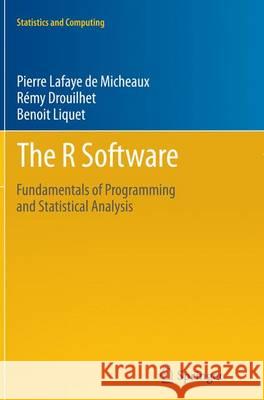The R Software: Fundamentals of Programming and Statistical Analysis » książka
The R Software: Fundamentals of Programming and Statistical Analysis
ISBN-13: 9781493941438 / Angielski / Miękka / 2016 / 628 str.
The contents of The R Software are presented so as to be both comprehensive and easy for the reader to use. Besides its application as a self-learning text, this book can support lectures on R at any level from beginner to advanced. This book can serve as a textbook on R for beginners as well as more advanced users, working on Windows, MacOs or Linux OSes. The first part of the book deals with the heart of the R language and its fundamental concepts, including data organization, import and export, various manipulations, documentation, plots, programming and maintenance.The last chapter in this part deals with oriented object programming as well as interfacing R with C/C++ or Fortran, and contains a section on debugging techniques. This is followed by the second part of the book, which provides detailed explanations on how to perform many standard statistical analyses, mainly in the Biostatistics field. Topics from mathematical and statistical settings that are included are matrix operations, integration, optimization, descriptive statistics, simulations, confidence intervals and hypothesis testing, simple and multiple linear regression, and analysis of variance. Each statistical chapter in the second part relies on one or more real biomedical data sets, kindly made available by the Bordeaux School of Public Health (Institut de Sante Publique, d'Epidemiologie et de Developpement - ISPED) and described at the beginning of the book. Each chapter ends with an assessment section: memorandum of most important terms, followed by a section of theoretical exercises (to be done on paper), which can be used as questions for a test. Moreover, worksheets enable the reader to check his new abilities in R. Solutions to all exercises and worksheets are included in this book."











